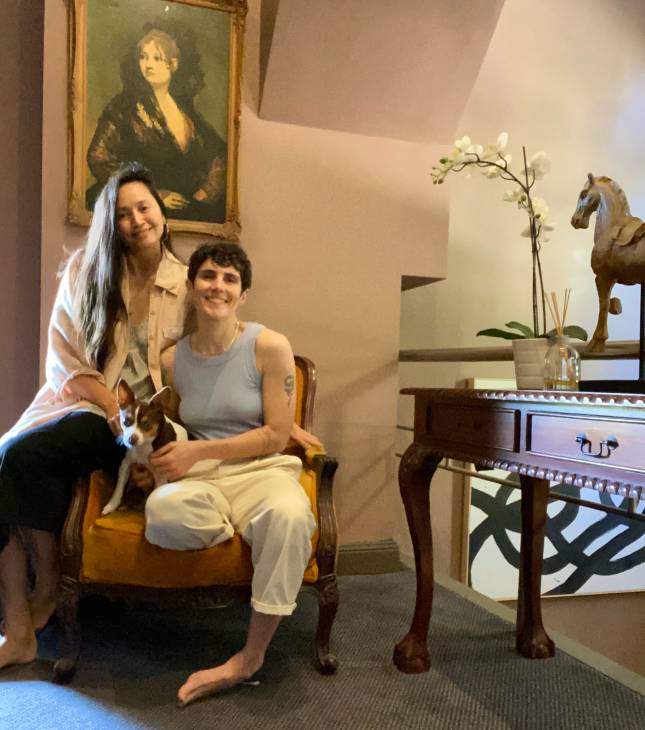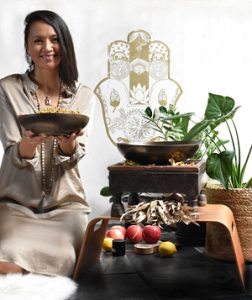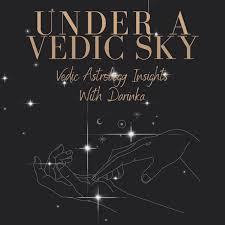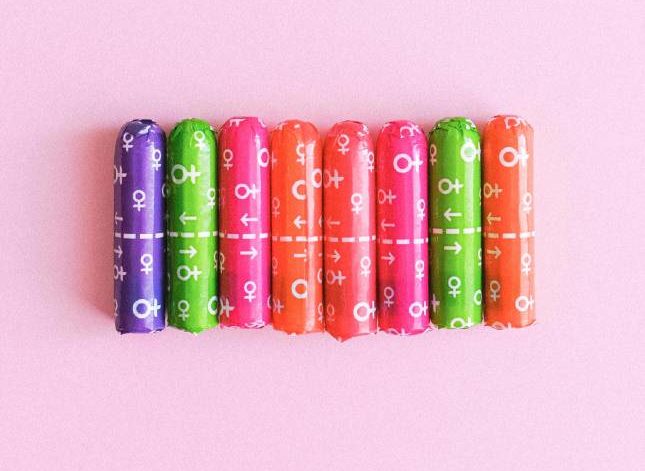Earlier this year I sat down with one of my favourite people, Vedic Astrologer Darinka. We talked about the practice, relevance and application of Jytoish (Vedic Astrology) for women as we navigate life phases, hormone changes and Karma. There’s also Venus remedies, the relationship between your birth chart and your health journey and more. Enjoy!
Dear readers, this is an abridged version of a really good, luxurious chat. For the full episode listen to Part 1 and Part 2 on my podcast Well Woman. Quicklinks to the podcast episodes:
What is Vedic Astrology
SS: Well, today I am thrilled to have the one and only darinka in the studio with me and we’re going to be talking all things Vedic astrology now darinka if you’re not familiar with her already is a Vedic astrologer, body worker massage therapist and she has a podcast called ‘Under a Vedic Sky’. I love that podcast, you give these wonderful bite sized forecasts each week and there have been some crazy things happening in our world lately, haven’t there?
D: There have, I I feel like astrology is a guide. It helps us make sense of things that sometimes feel a little too unusual to just ignore.
SS: And I guess it’s getting that deeper insight. To bring the macrocosm microcosm idea in here, greater insights into what’s happening universally, but also in our internal universe. I found that so fascinating when I had a session with you. So everybody, I’m speaking from experience today. Darinka did my chart a few years ago. So firstly, the term ‘jyotish’, tell me about that word…
D: It comes the word ‘jyoti’ which means light and ‘ish’ which is a a suffix for the supreme reality. Or the word ‘God’, something like that. So there’s many names. Jyotish is the science of light because it’s light that gives us the information that we need in order to see our path. Is it kind of like also a gateway into the subtleties of the world that we live in as well… because we get really caught up in the physical realm and what’s on the surface or in the material
SS: And is it just a way to go deeper?
D: It is. Good question. It’s actually all of yogic theory and yogic knowledge, which is Vedic knowledge, including Ayurveda (the Indian system of health and healing), jyotish, mantra and all of the branches of the Vedas. But particularly with Jyotish, the philosophy that underpins it is based on the Law of Karma. What I’ve often noticed is that people can be sceptical of of systems, because there’s this idea that people don’t like that their fate is already written. But the notion of Karma is cause and effect. Everything that you are today – your heritage, your height, your body, your skin colour, your relationships, your parents, how many children, everything that brings you to this moment – is a result of past actions. Just like an oak tree is a reflection of the seed and all the information that was in that seed. When you’re studying Jyotish and you’re looking at the birth chart, you’re actually looking at yourself and all of the past impressions that have brought you to this moment and probable future if you continue on your current trajectory.
SS: When you did my reading for me, I felt like I saw so many aspects of my life, my partner, my child, my parents…. There was so much in that chart, it was some sort of imprint and I had no idea the insights were going to be that vast.
D: It is. I think people are so surprised. But then also they get a deep sense of clarity and affirmation when the stranger that they don’t know, and even in my recorded consults, I’ll just get the time, the place and the date of birth and then there’ll be some questions that I’ll answer, and people say “it feels like you know me so well”. And that’s because astrology, in a way, it’s a language rather than a belief system. And once you understand how that language works and the rules with with that, then you can read people’s charts because it’s full of symbols that contain enormous meaning. And then it requires, yes, intellectual skill and knowledge, but also intuition to divine the answers or insight.
SS: What got you into Vedic astrology?
D: I started astrology because it was the first time that I got some clarity on my past and my life experiences and my childhood and the intensity that I had personally experienced in life, including the death of my parents and a lot of unsettledness. The first time I read astrology and it was Western, it had moon in the 12th house cross with Pluto and had Scorpio, and one of the first things it said was ‘early death of the mother or an intense experience with the mother’. And I was like, wow, how does this know? My journey and all the healing arts I practice is really about healing myself. I wanted to know myself so I could manage my emotions, but I wanted to do body work so that I could feel safe in my body again. I I discovered these things because that’s what my natural curiosity led me to. I explored yoga because I had a connection with India from my past. And through the yogic system, I found a vast body of knowledge that I could not surpass anywhere else in terms of understanding the deep, esoteric mysteries of the universe and the creation of atomic matter. And you know, I just went into these rabbit holes in my early 20s. That led me to Vedic Astrology and I realised that it was totally different to Western and my sign was different. I felt like there was so much more depth and integrity to it and I decided that I needed to actually learn astrology properly with the teacher.
SS: I”m sorry to hear about your mother. I’ve known you for many years now and it is life changing, isn’t it? It changes us at a very soul level when we go through those those tragedies. And your father too.
D: I was seven months old, actually, and my mom had a deep connection to India. And both my parents were devotees … I think it was more like my mum, of Sathya Sai Baba. She went to his ashram in Bangalore to see if he could heal her. She had leukaemia while she was pregnant with me. He said that the cancer was too far gone and he couldn’t heal her, so she actually passed away in Bangalore in her favourite country. With any kind of loss and intensity or tragedy or abuse, it does change you at a very core level. And you think, why? Why me? Why did I suffer? Why do I have to go through this, you know? And it sets you apart. You know there’s loss, so you have to deal with that and I don’t fully agree with just the clinical Western model of treatment. I could go to the psychotherapist and or the psychologist, and they could say you have this condition. You have that. But they won’t understand the background of trauma. They won’t understand the Karma that’s associated with it. They won’t understand past lives. They won’t consider even these things. I just have always known that there’s more to life than what is on the surface. And I’ve always from a young age, felt like I wanted to pull back a veil. And I wanted to know how did I get here in this body? Why am I thinking and cognising and seeing from behind these eyes?
Karma, what is it?
SS: Just tell me a bit more about karma. You mentioned it before and I’ve been confused by this word in the past, you know, because I hear about in certain ways sometimes more often negative than positive. What’s your take on karma?
D: It’s a Sanskrit word and it means action. That’s all it means. Unfortunately, in our culture, we tend to see it as punishment. And this I feel, is because of religion and because of 1500 years of oppression and the sense of being punished by by God or by these people that that control and dominate society. Whereas in Dharmic religion, in Asia and India and in the ancient Chinese culture as well, Dharma means living in accordance to your true self and you’re not punished for your actions, but you are punished by your actions. So when I was a little kid, I was sitting in the kitchen and the hot stove was on the hot plate and Dad said don’t touch the stove. So my head was like, well, why not? So I put my hand there and I burnt my hand. And then I found out why I shouldn’t touch it. And so I was free. I have my free will to take action, Karma. But I’m not free of the consequences of those actions. And that’s essentially what Karma is.
In a way, Karma is very impersonal. And so we say, how can you say that it was that persons karma to get murdered? Well, when we string out lifetimes, we don’t know the roles that we played. If we think about how many tribes have killed each other, how many humans have done atrocious things to each other, that gets recorded. There’s memory in that, we carry that memory. Birth marks can indicate a place where you may have died or been speared and you know so it can show up on the body. Karma is an extremely complex and intricate system, but when you pay attention to those laws of life, then you start to see how it operates. The problem is that we attached emotion to these things.

Darinka and Muku with me in the clinic waiting to record our podcast episode.
Vedic astrology+ Women’s health
Darinka and I talked about the impact of living in a world that many of us women find highly driven, excitatory and yang.
D: I feel that the balance of the masculine and feminine is so deeply out of balance, and that’s reflected in the type of people that are being born, which is also reflecting all of the synthetic hormones and chemicals that are being used in our food. That’s impacting the way that we develop, which is reflecting a greater cycle of time which is well out of balance. So what can we do? You know, essentially when you’re studying astrology or looking at a chart, you’re looking at your nature. You’re looking at what is the reality of the situation? There’s nothing there that’s not actually happening and when you know that’s your nature, you have to go against that. Sometimes my tendency is to be lazy and stay in bed…. Well, no one’s going to kick me out of bed! I know that’s my tendency, so I have to do things to counter get counter act it and that’s what makes it so hard because you don’t want to change humans. We are inherently lazy as as a species. (I’m nodding in agreement here:)!)
And there’s nothing wrong with that, but it’s just it’s just understanding that you know, for us to make a positive, effective change in our life, we have to take that responsibility and gain that self awareness. So when it comes to, you know, masculine and feminine, we see it as the Shiva and Shakti, you see it as the Ying and the Yang. You see it as polarities that exist, you know and and our bodies. What’s also interesting is the planets also reflect the organs in the body and the sun, and the moon reflect the right eye for the sun and the left eye for the Moon. And say if there’s an affliction, for example, because they represent our eyes. And many people have wear glasses, but an afflicted sun or moon in some way indicates eyesight issues.
The sun is is the active force of consciousness. If the sun is the soul, the moon is the mind. So ideally you want the mind to be healthy and clear so that it can reflect the agenda of the soul, without our hinderance.
S: So interesting. And that reminds me then of that alternate nostril breathing the Nadi Shodhana. About balancing that Ida and Pingala, that would be a nice practise, wouldn’t it?
D: Absolutely and valuable.And that’s again like that would fall into, you know, one of the remedies you know for balancing the hemispheres.
S: And I imagine in your sessions as well, because you gave me a mantra to practise the Ganesha mantra, you would have remedies that you could recommend to your clients as well.
D: So it could be mantra or it could be a herbal tea or some sort of daily ritual, some meditation technique.
S: Have you got a favourite? Have you got something that you find always helps you to come back into balance?
D: I think one of my favourite ways to nurture my moon is I don’t have a bath, but I love water and bath and I love doing foot baths. The feet also are connected to Pisces. It is also about grounding and you know it’s just so nice having your feet touched and massaged sometimes and and so just soaking my feet is just such a nice, soft gentle way to ground myself. And also just to have a bit of that water element around so I feel that being around water and making a conscious effort to immerse myself in water in some some way is really balancing for my moon.
S: What do you do? I want to imagine this footpath sounds 🙂
D: Ah, well, this one was with the essential oils and apple cider vinegar and ylang ylang and some nice, some nice flowers. So that’s one of my favourite ones. Another one is mantra. I do love the sounding, so there are different mantras for different planets or different times and so keeping fresh flowers around from my garden. I like picking flowers and putting that in front of Lakshmi and Ganesh. Red flowers like Hibiscus in particular.
S: Oh wow, this is all sounding very satvic, just a beautiful space to be in.
…and there’s more including Lakshmi rituals for wealth, training with Darinka and hearing Darinka recite a mantra. Tune into the podcast episodes to hear the interview in full.

Darinka Maja is a vedic astrologer trained by the renown Vedic astrology teacher and author Komilla Sutton. She presented at the Fresh Talents in International Vedic Astrology Conference in New Delhi in 2018. Darinka offers full and mini consultations in Jyotish, recorded readings, Chart analysis, relationship analysis, Vedic counselling as well as yearly Vedic Astrology calendars. She also offers massage and other bodywork treatments.
Connect with Darinka:
- www.darinkamaja.com
- Listen to ‘Under a Vedic Sky’ – Darinka’s podcast
- Read Darinka’s Vedic astrology blog
- Follow Darinka for regular updates on Instagram
- To join Darinka’s Beginners Vedic Astrology course contact Darinka directly via her website or socials.

Hey there! Welcome to my world of totally natural and powerful healing medicines. Medicines from nature. Medicine from Source. I’m a naturopath and herbalist with extensive clinical experience working with a range of health conditions including hormonal, metabolic, mental health, sleep and more.
I’ve brought together years of clinical and teaching experience, academic skill and curiosity to bring you this blog. I hope you enjoy it! If you do, leave a comment, I’d love to hear from you!






